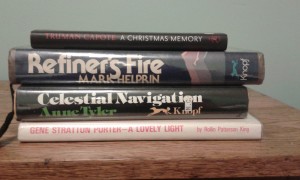Some fragments of Christmastime cheer to help you stay merry:
I was standing in line at the post office to mail a package to my nephew in Colorado. There was only one customer ahead of me—a woman with two parcels on the counter. A young girl stood next to her with two more brown-paper packages in her arms. On the side of one of the packages, in large green letters, was written: “No socks inside!”
◊
My sister Holli got a large, real tree and set it up in the living room of her house. She filled the tree stand with water, and checked it the next day. She was pleased to find that the tree had sucked up a good bit of the water. “That’s a good sign!” she told her husband Bobby, as she added more. She added more water the next day.
On the day after that, Bobby noticed an unpleasant smell in the room and asked Holli to come smell it with him. They sniffed at the fireplace, thinking a varmint had died in the chimney. They checked under the house, but no, the smell was definitely inside. “Do you think something came in with the Christmas tree?” Holli asked. (I pictured a wee field mouse clinging to the trunk, dying of fright during the ride on top of the car, and then having tinsel and lights draped over its tiny corpse.)
They began a more careful check of the living room and soon found that the quarts of water from the tree stand had leaked out and been sucked up into the area rug. “And there I was bragging about my Christmas tree drinking so much water,” Holli said, sadly.
◊
Well, it’s a simple fact that not everything goes smoothly during the holidays, does it? Our church Christmas program was planned for simplicity so that we could put it together in a short amount of time with a small number of people and not mess it up. The minister’s wife said, “It’s all songs that we know, with a narration of the Christmas story, and we’ll practice twice.” We practiced twice, and found that, unschooled and mostly lacking in talent, we were simply not up to the task of singing “While Shepherds Watched Their Flocks” or “Angels From the Realms of Glory.” Those two songs were edited out of the program almost immediately. Anyway, angels and shepherds appeared in the lyrics of some of the other songs, so it hardly mattered. Simplicity—that was the ticket.
It came to pass that on the day of the Christmas program, the music left propped on the organ had been mysteriously scrambled. Instead of following “Hark, the Herald Angels Sing” with “O Little Town of Bethlehem,” the minister’s wife began playing “We Three Kings,” which should have come nearer the end of the production. Those of us in the choir made that shift successfully, but then had no idea of what we were expected to sing next. After much rustling of song sheets and a stage-whispered consultation with the minister’s wife, we got back on track and limped to the finish in record time. I believe that in at least two cases we finished singing our song before the minister’s wife had quite finished playing it.
Afterwards the minister said, “Well, wasn’t that a lot of fun!” His wife, still seated at her instrument, shook her head no. He didn’t get a single “Amen” from the congregation, either, but with no decrease in enthusiasm he added, “And don’t you know that Jesus enjoyed it!”
◊
Finally, from my friend Elizabeth von Arnim we get a sweet illustration of a German country Christmas, complete with three Christmas trees in the library:
It is the fashion, I believe, to regard Christmas as a bore of rather gross description, and as a time when you are invited to over-eat yourself, and pretend to be merry without just cause. As a matter of fact, it is one of the prettiest and most poetic institutions possible, if observed in the proper manner…. [F]or days beforehand, every time the three babies go into the garden they expect to meet the Christ Child with His arms full of gifts. They firmly believe that it is thus their presents are brought, and it is such a charming idea that Christmas would be worth celebrating for its sake alone.
…
When the trees are lighted, and stand in their radiance shining down on the happy faces, I forget all the trouble it has been, and the number of times I have had to run up and down stairs, and the various aches in head and feet, and enjoy myself as much as anybody.
(There follows a description of the singing of carols, and the distribution of gifts to all of those who work on the family’s estate, until finally the festivities come to an end.)
When [the babies] came to say good-night, they were all very pale and subdued. The April baby had an exhausted-looked Japanese doll with her, which she said she was taking to bed, not because she liked him, but because she was so sorry for him, he seemed so very tired. They kissed me absently, and went away, only the April baby glancing at the trees as she passed and making them a curtesy.
“Good-bye, trees,” I heard her say; and then she made the Japanese doll bow to them, which he did, in a very languid and blasé fashion. “You’ll never see such trees again,” she told him, giving him a vindictive shake, “for you’ll be brokened long before next time.”
She went out, but came back as though she had forgotten something.
“Thank the Christkind so much, Mummy, won’t you, for all the lovely things He brought us. I suppose you’re writing to Him now, isn’t you?”
I cannot see that there was anything gross about our Christmas, and we were perfectly merry without any need to pretend, and for at least two days it brought us a little nearer together, and made us kind.
So may we all be brought nearer together, and as we are merry we should remember also to be kind. If we chance to over-eat ourselves, let us not forget in our stupor to write our own thank-yous to those who bring us gifts—even if we find upon unwrapping the package that there are, in fact, socks inside.


